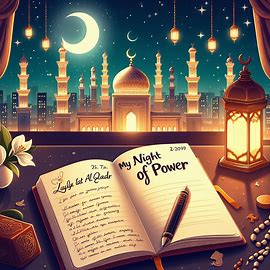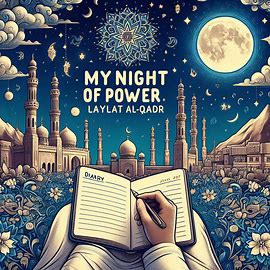Laylat al-Qadr 2025: Blessed Unique Night of Power!

Laylat Al-Qadr, also known as the Night of Power, is considered the holiest night in the Islamic calendar. It commemorates the night during Ramadan when the first verses of the Qur’an were revealed to the Prophet Muhammad محمد صلی اللہ علیہ وسلم by the angel Gabriel (Jibrīl). This event is believed to have occurred on one of the odd-numbered nights in the last ten days of Ramadan, specifically in the year 610 CE12.
1 . Laylat Al-Qadar Historical Significance
The historical significance of Laylat Al-Qadar is immense, as it marks the beginning of the revelation of the Qur’an, which would continue over the next 23 years. Muslims believe that on this night, the divine decree for the year is made, and prayers are especially powerful. It is a time for prayer, reflection, and seeking forgiveness.
The exact date of Laylat Al Qadar is not definitively known, but it is widely observed on the 27th night of Ramadan by Sunni Muslims, while Shi’a Muslims commonly commemorate it on the 23rd night2.

The night is described in the Qur’an as “better than a thousand months” (Qur’an 97:3), indicating the immense value and reward of worship during this time. Devout Muslims often spend the night in prayer, recitation of the Qur’an, and other forms of worship, seeking the blessings and mercy of Allah1.
2 . Significance of Laylat Al-Qadr from the Quran and Hadith
From the Quran:
- Surah Al-Qadr (97:1-5):
- “Indeed, We sent it [the Quran] down during the Night of Decree.”1
- “And what can make you know what is the Night of Decree?”1
- “The Night of Decree is better than a thousand months.”1
- “The angels and the Spirit descend therein by permission of their Lord for every matter.”1
- “Peace it is until the emergence of dawn.”1
From the Hadith:
- The Prophet Muhammad محمد صلی اللہ علیہ وسلم (peace be upon him) said: “Whoever establishes prayers on the night of Qadr out of sincere faith and hoping to attain Allah’s rewards, then all his past sins will be forgiven.”2
- Aisha (may Allah be pleased with her) reported: “With the start of the last ten days of Ramadan, the Prophet محمد صلی اللہ علیہ وسلم (peace be upon him) used to tighten his waist belt (i.e., work hard) and used to pray all night, and used to keep his family awake for the prayers.”2
- The Prophet محمد صلی اللہ علیہ وسلم(peace be upon him) also said: “Seek Laylat al-Qadr in the odd nights of the last ten nights of Ramadan.”3
These quotes reflect the significance of Laylat Al-Qadar as a time of intense worship, prayer, and seeking forgiveness, with the hope of attaining great rewards from Allah. It is the night when the Quran is first revealed, and it offers an opportunity for Muslims to have their past sins forgiven.
3 . Laylat Al-Qadr’s Common Practices
- Reciting the Holy Quran: This is seen as one of the best ways to engage in the remembrance of Allah (SWT), with many scholars recommending recitation as much as possible during this night1.

Reciting the Holy Quran - Making Dua: It is encouraged to prepare a list of supplications, asking for blessings in this life and the hereafter, and for the well-being of others1.
- Offering Salah (Prayer): Performing extra prayers, such as Taraweeh or Qiyam al-Layl, either in congregation at mosques or individually at home, is a common practice2.
- Seeking Forgiveness: Asking for forgiveness from Allah (SWT) with humility and sincerity is emphasized on this night1.

Seeking Forgiveness: - Engaging in Good Deeds: Muslims are encouraged to engage in as many good deeds as possible, such as helping the poor and giving in charity1.
- Avoiding Sin: It is important to avoid sinning and focus on worship and remembrance of Allah (SWT)1.
- Patience and Reflection: Spending the night in contemplation, patience, and seeking knowledge about the significance of Laylat Al Qadar1.
These practices are aimed at maximizing the blessings of this special night, believed to be better than a thousand months of worship1.
4 . Seeking Forgiveness during Laylat Al-Qadar is of Profound Significance
- Divine Mercy: Laylat Al-Qadar is a night when Allah’s mercy and forgiveness are believed to be at their peak. It is an opportunity for Muslims to seek pardon for their past sins and mistakes with the hope of being cleansed1.
- Elevation of Status: Sincere repentance and seeking forgiveness can lead to an elevation of one’s status in the eyes of Allah, as it demonstrates humility and recognition of one’s dependence on divine grace2.
- Renewal of Faith: It is a time for Muslims to renew their faith, make resolutions for the future, and strengthen their relationship with Allah3.
- Answered Prayers: The night is characterized by the descent of angels, including the angel Gabriel, and it is believed that prayers made during this time, especially those asking for forgiveness, are more likely to be answered4.
- Precedent from the Prophet: The Prophet Muhammad (peace be upon him) encouraged his followers to seek forgiveness and engage in extra prayers during this night, setting a precedent for Muslims to follow5.
In essence, seeking forgiveness during Laylat Al-Qadar is a means to attain spiritual purification, divine blessings, and a fresh start. It is a night to turn back to Allah, seeking His forgiveness and mercy with the hope of being forgiven for all previous sins.
